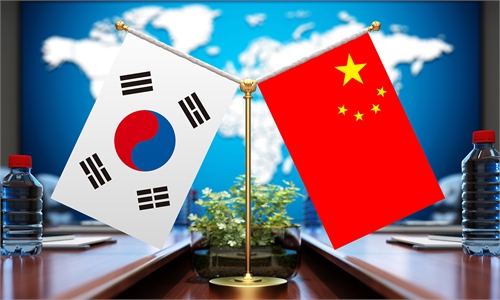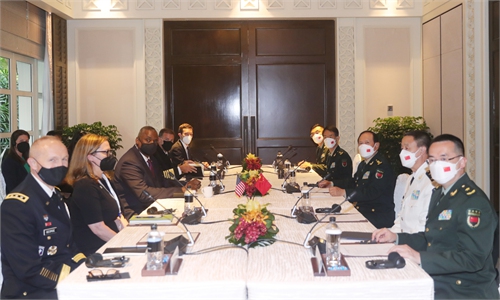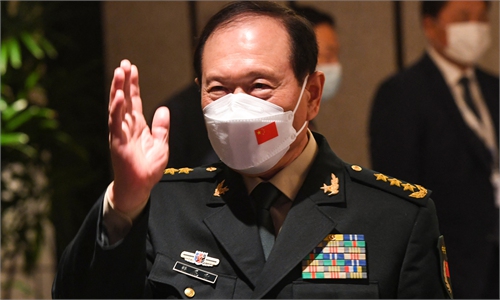Chinese delegation says Indo-Pacific Strategy ‘fanning confrontation’ as US defense chief made ‘most barefaced’ Shangri-La speech attacking China
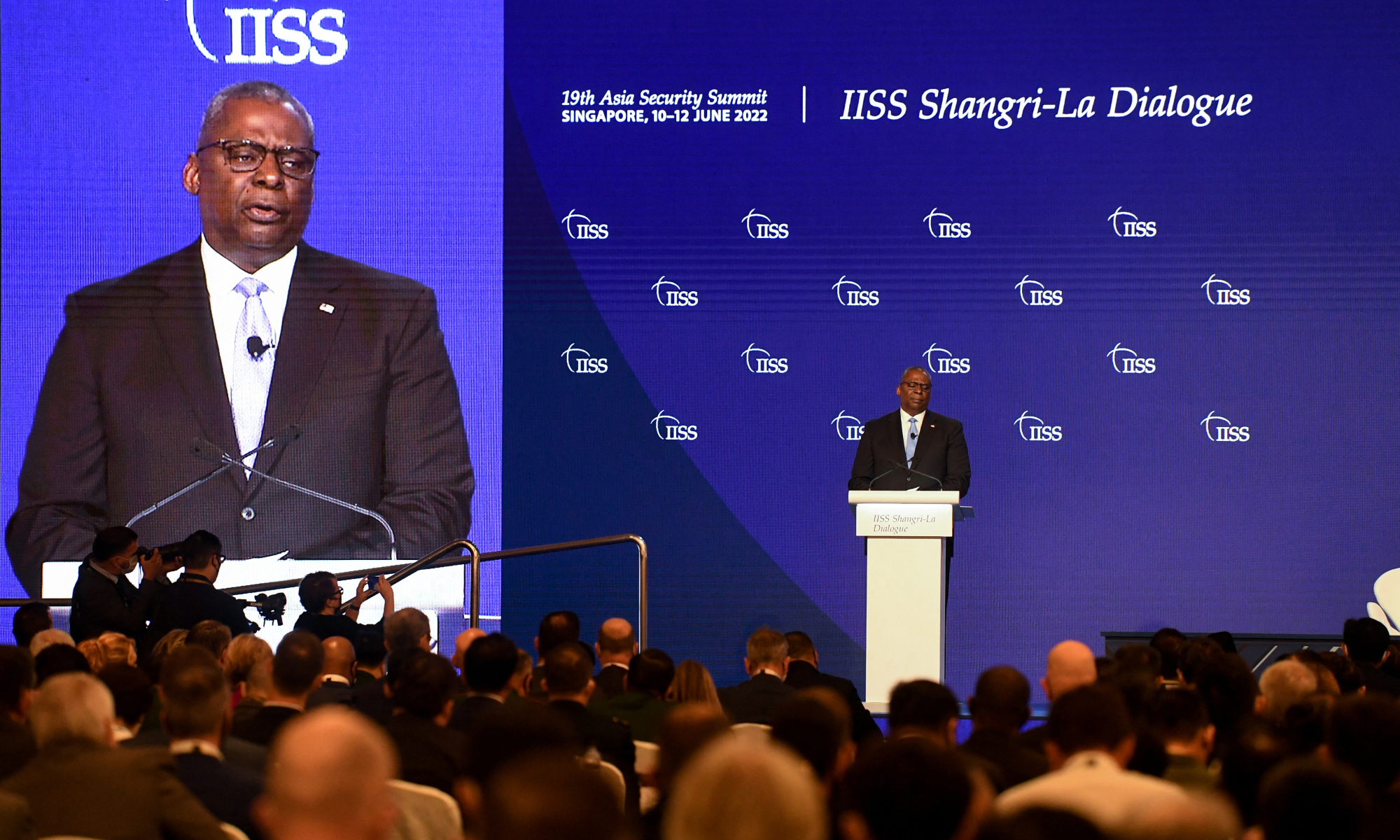
US Defense Secretary Lloyd Austin speaks at the Shangri-La Dialogue summit in Singapore on June 11, 2022. Photo:AFP
US' Indo-Pacific Strategy is aimed at maintaining US hegemony, creating divisions and fanning confrontation, the Chinese delegation said, refuting US Defense Secretary Lloyd Austin's speech at the IISS Shangri-La Dialogue on Saturday as Austin took advantage of the stage to propagandize US' Indo-Pacific Strategy and to point finger at China.
Zhang Zhenzhong, deputy chief of the Joint Staff Department in the Central Military Commission, told reporters on Saturday at the 19th Shangri-La Dialogue in Singapore, that the Indo-Pacific Strategy is designed to trap the Asia-Pacific region into a geopolitical game and confrontation as it tries to form a small circle by roping in some countries to incite against others. It seriously impacts the ASEAN-centered regional cooperation architecture and seriously harms the overall and long-term interests of countries in the region, he added.
"The US has already turned the Middle East and Europe into a mess, does it want to mess up Asia-Pacific next?" Zhang asked, adding that this is absolutely not allowed.
Zhang said the US' strategy is designed to destroy peace. The mainstream voice of Asia-Pacific countries is peaceful coexistence and win-win cooperation, but the US, in contrast, advocates competition between major powers and creates military confrontation, sending warplanes to showcase its military might in the South China Sea, launching military drills with allies, which all created tensions in the region. In conclusion, Zhang said that strategy served US' own interests against the common will of the regional countries, and stressed that for these reasons it must not succeed.
Austin on Saturday gave an hour-long speech themed "Next Steps for the United States' Indo-Pacific Strategy," in which he called the strategy "our priority theater of operations" and "at the heart of American grand strategy."
He also openly criticized China for being "coersive and aggressive."
Austin specifically raised the Taiwan question. "The stakes are especially stark in the Taiwan Strait," he said, adding that US' policy on Taiwan was to remain opposed to any unilateral changes to the status quo. "Our policy hasn't changed. But unfortunately, that doesn't seem to be true for the PRC," Austin noted.
Austin's rhetoric can be translated as the US opposes China's reunification, Song Zhongping, a Beijing-based military expert, told the Global Times.
With this is mind, Song said that Pentagon and the White House are attempting to internationalize and complicate the Taiwan question, which is a matter of China's domestic affairs.
This mentality has been refuted by China in multiple occasions, including during the face-to-face meeting between China's State Councilor and Defense Minister Wei Fenghe and Austin in Singapore on Friday.
There is only one China, and Taiwan is a sacred, inalienable part of China's territory, Wei told Austin, noting that if anyone dares to separate Taiwan island from China, the Chinese military will not hesitate to fight, and will resolutely crush any "Taiwan independence" attempts at all cost to firmly safeguard national sovereignty and territorial integrity.
On Saturday, Zhang also responded to Austin's hype over Taiwan question. Taiwan question is China's domestic affairs, the one-China principle is the political foundation of China-US ties, on which successive US governments have made clear commitments. President Joe Biden also stated that he does not support "Taiwan independence," but the US' words are obviously not matched by its deeds, and Washington has kept playing the Taiwan card, severely obscuring and hollowing out the one-China policy, Zhang added.
Zhang said that the Taiwan question can most likely lead China-US ties to conflict and confrontation. If not handled properly, it will have a subversive impact on the relationship between the two countries. There is only one China in the world, Taiwan is an inalienable part of China's territory, and the government of the People's Republic of China is the only legitimate government representing the whole China. This is the only correct understanding of "one China." The reunification of China is the aspiration of Chinese people, and the national rejuvenation is unstoppable. The Chinese People's Liberation Army (PLA) will stand ready to defend the country's sovereignty, security and territorial integrity at all costs.
Hyping PLA's intercepts
"We've seen an alarming increase in the number of unsafe aerial intercepts and confrontations at sea by PLA aircraft and vessels," Austin said in his speech.
In response to the remarks, Zhang said at the media briefing that the incident occurred near the maritime and airspace of China's Xisha and Nansha islands, not in the adjacent sea and airspace of US allies. The actions taken by the Chinese military are necessary measures to deal with the provocations, and are reasonable, safe and professional.
Prior to the Shangri-La Dialogue, China has already denounced Australian and Canadian "disinformation" over jet encounters. The two countries, however, turning a blind eye to the warnings from the Chinese side, kept carrying out close-in reconnaissance and provocative activities by surveillance planes in East and South China Seas. "This is a dangerous act against China's national security and the safety of Chinese and Canadian front-line personnel," Chinese Foreign Ministry Spokesperson Zhao Lijian said at a Regular Press Conference on June 6.
These days, there has been analysis that the reason why Canada and Australia have not stopped hyping up the case is to create topics for the ongoing dialogue over Asian security, taking "China threat" theory to a new level.
He Lei, lieutenant general and former vice president of the PLA Academy of Military Sciences, who is attending the Shangri-La Dialogue, told Global Times that Austin's accusations against PLA's aircraft interception obviously aimed at endorsing Canada and Australia, reinforcing US-led small circles. Austin talks about "common vision" in Indo-Pacific region, but what Washington has shown is its clear-targeted and exclusive behaviors, He added.
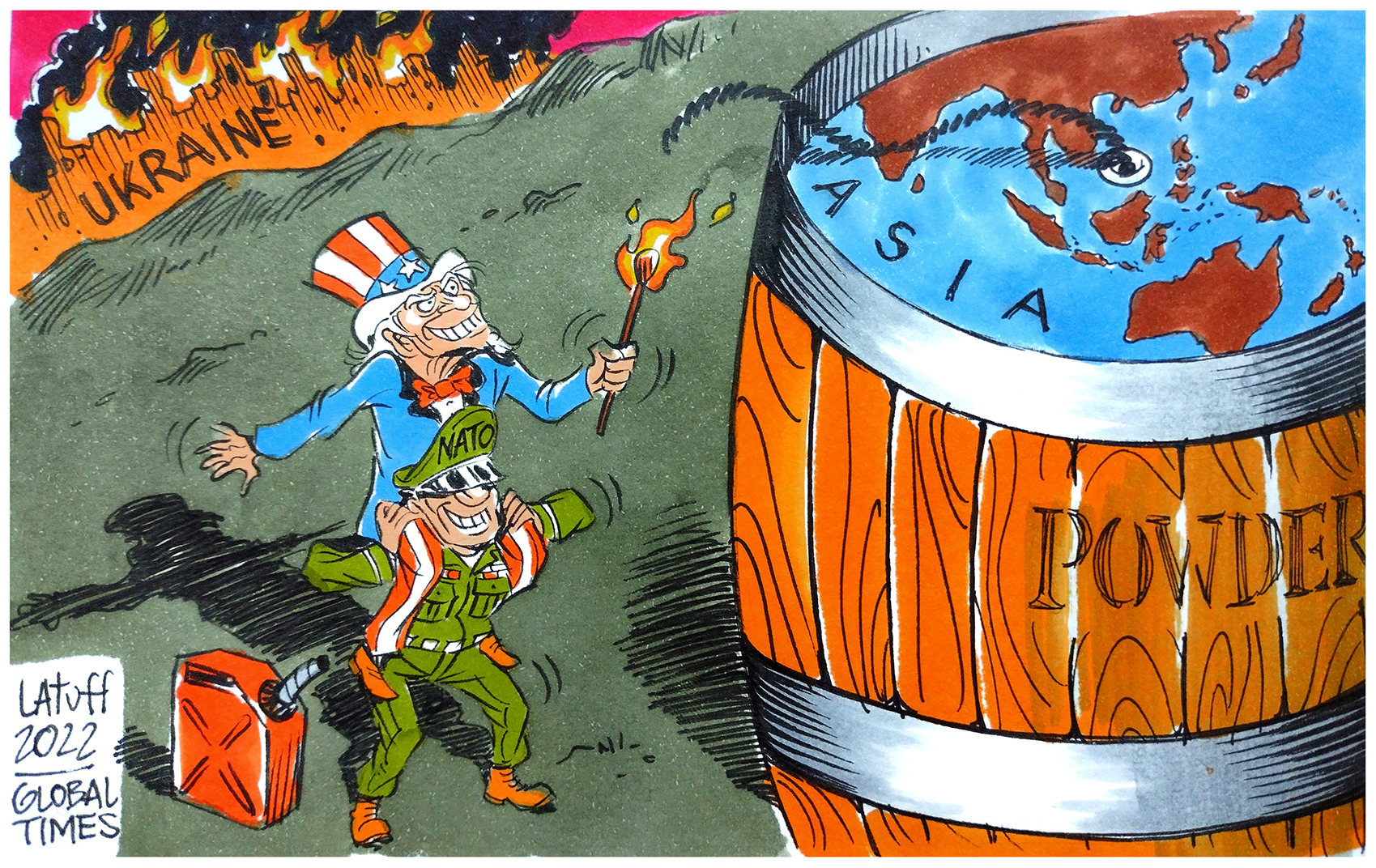
After Ukraine, US-led NATO wants to turn Asia Pacific into a new powder keg. Illustration: Carlos Latuff
Most barefaced accusations
Austin also hyped up territorial disputes in the Indo-Pacific region, naming East and South China Sea issues, and border disputes with India. "Indo-Pacific countries shouldn't face political intimidation, economic coercion, or harassment," Austin said. "We'll do our part to manage these tensions responsibly," he added.
Lieutenant General He said Austin's speech is the most blatant and most comprehensive slander against China compared to previous US defense chiefs' remarks at the summit, as this is the first time that a Pentagon chief raised Taiwan question, the South China Sea, the East China Sea issue, and China-India border dispute all at the same time.
Zhao Xiaozhuo, a research fellow at the Academy of Military Sciences of the PLA, told the Global Times that US real intention is to boost its alliance system, mobilizing its allies to maintain the US' versions of rules-based international order, shaping China's peripheral environment, piling enough pressure on China and eventually realize the containment of China's emergence.
Observers say Austin's speech mirrors that the US opposes everything China does to safeguard its own national security and interests. And it is largely due to incitement of outside forces, especially the US and its allies, contradictions and disputes in Indo-Pacific region come to where it is today.
By hyping up tensions and so-called China threat, the US is trying to drive a wedge between China and regional countries, while kidnapping more countries to its side to coordinate with its Indo-Pacific Strategy. And the US could paint itself as "entitled" to play the role as an arbitrator of the region, far away from its own soil, and take Asian affairs under its control, Wei Dongxu, a Beijing-based military expert, told the Global Times.
However, most Asian countries do not want to take a side in major power games. During the 2019 Shangri-La Dialogue, Singaporean Prime Minister Lee Hsien Loong raised concerns, "Unfortunately, when the lines start to get drawn, everybody asks: Are you my friend or not my friend? And that makes it difficult for the small countries."
On the Taiwan question, the majority of regional countries refuse to dance to the US tune, as they are well aware that the US is an outsider, and has no right to intervene in China's domestic affairs, Wei said.
Hegemonic mentality
During the speech Austin brought up the so-called rules-based international order to cover US intentions. He took the Russia-Ukraine conflict as an example. "The Ukraine crisis poses some urgent questions for us all... And I am here because the rules-based international order matters just as much in the Indo-Pacific as it does in Europe," he said.
This is an arrogant, hegemonic mentality, Wei told Global Times. Wei said the so-called rules are not at all fair and square rules which are accepted by the international community, but a US-dominated one, in which the US is the one and only boss and other has to listen to it.
The Ukraine crisis is a proof that US-led rules have caused great harm to US allies and Europe as a whole. Not to mention the emerging energy and food crisis, increasing European countries are losing their diplomatic independence and autonomy, experts said.
During the ongoing Summit of the Americas, questions toward US-led rules-based orders are surfacing. It signals that be it Indo-Pacific regions or wider range of the international community, hypes of the US over so-called tensions will find fewer countries to join in the chorus, Wei said.
Although the US has this intention to shape events, and it has some followers like Japan, Australia and those who are far from the region like the UK and Canada, it's plan won't be realized, said Lü Xiang, an expert on international relations and US studies at the Chinese Academy of Social Sciences.
"Only the countries with enough power and strength, as well as the support from the most regional countries, are able to shape the strategic environment in a specific region. In the Asia-Pacific region, the US is not such a country, but China is," he said.
Although Austin outlined some ambitious plans in his speech, but it's questionable to all regional countries that to what extent the US can make its plan come true, experts said.
The countries named by Austin, Indonesia, Singapore and Vietnam all have stable and friendly ties with China. Even if there are some differences or disputes, they prefer to solve the problems with China rather than be blindly used by the US to pay for its costly confrontation with China, said analysts.

